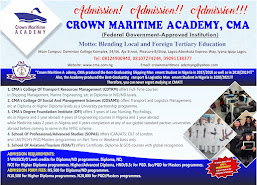NIWA, Ocean Ambassadors Foundation Push for Inclusive Blue Economy at Ehingbeti Forum
By Kathy Kyari
The Lagos Area Manager of the National Inland Waterways Authority (NIWA), Engr. Sarat Braimah, has called for increased investment and political will to harness Nigeria’s vast inland waterways, describing the sector as a “sleeping economic giant” capable of easing congestion, boosting trade, and empowering coastal communities.
Speaking at the 3rd Ehingbeti Blue Economy Hub held on Tuesday in Lagos, Braimah emphasized that the creation of the Federal Ministry of Marine and Blue Economy by President Bola Ahmed Tinubu’s administration was a strategic step towards unlocking the immense opportunities embedded in Nigeria’s maritime ecosystem.
The event, themed “The Renaissance of Ehingbeti in Community Engagement and Inclusivity,” brought together policymakers, industry leaders, and community stakeholders to discuss strategies for inclusive development within the blue economy space.
In her welcome address, the Convener of the Ehingbeti Blue Economy Hub and Founder of the Ocean Ambassadors Foundation, Mrs. Violet Olaitan Williams, described the gathering as a milestone in the collective pursuit of sustainable growth across Nigeria’s coastal communities.
“Today marks a significant moment in our quest to harness the vast potential of our ocean resources in a sustainable and inclusive manner,” Williams said. “At the Ocean Ambassadors Foundation, we firmly believe that the development of our coastal communities is a shared responsibility. We cannot leave the government alone in this endeavour, all hands must be on deck.”
Williams noted that over the past two editions, the hub has produced valuable outputs, including a documentary and a book highlighting the historical significance of Ehingbeti within the modern blue economy framework. She added that this year’s keynote paper, “Unpacking the Potentials of Inland Waterways in the Blue Economy,” would provide insights to shape future policy and community-focused strategies.
Echoing this call for collaboration, Engr. Braimah stressed the urgent need for Nigeria to invest heavily in inland waterways, which she described as a vital yet underutilized asset.
“Because inland waterways form the majority of what we do directly with the communities that are surrounded by water, there are a lot of potentials in inland waterways,” she said. “That is why the government of Bola Ahmed Tinubu made a special ministry. Before, there was nothing like Marine and Blue Economy, what we had was the Federal Ministry of Transportation.”
Braimah revealed that Nigeria has over 1,000 kilometres of navigable waterways connecting 28 littoral states and five West African countries, yet these remain largely untapped. “Why is this not tapped? It’s because we are not looking at it. This country is not investing in inland waterways,” she lamented.
Citing China’s success story, she explained, “If you go to China today, they started investing in their inland waterways just five years ago. Where they are today is what is making them popular in the whole world. That is why we want to follow suit.”
She attributed the lack of progress to inadequate funding and limited political commitment. “It is very capital-intensive. And our politicians, I’m sorry to say, don’t want to invest money where people cannot see. If they put videos of dredging, you might not see it and you don’t vote for them, so they will not do it,” she stated.
Braimah emphasized that boosting inland water transport would ease road congestion, reduce accidents, and improve cargo movement efficiency. “If we are moving candles by water, we can move tonnes and tonnes without seeing all these incidents on the road. Look at Apapa congestion, the solution is investment in water transport,” she added.
She commended the Lagos State Government for its proactive investments in water transport infrastructure, including the integration of ferries and the regulation of private operators. “Lagos has invested a lot in the inland waterways. Other states are now following suit. You can see the ferries, the terminals — all regulated by the National Inland Waterways Authority,” she said.
Braimah also disclosed that NIWA’s ongoing dredging of the River Niger and related projects are designed to make the waterways more viable for passenger and cargo transport. “When it is working, all the coastal communities will enjoy it. Badagry, for instance, will benefit immensely once the proposed Badagry Port becomes operational,” she noted.
Braimah reaffirmed NIWA’s commitment to inclusiveness and sustainable growth across coastal communities, pledging continued collaboration with stakeholders to advance inland waterway development.
“So that is the inclusiveness we are talking about here today,” she said. “Thank you so much for bringing inland waterways to the limelight. We will continue to do that.”




















0 Comments